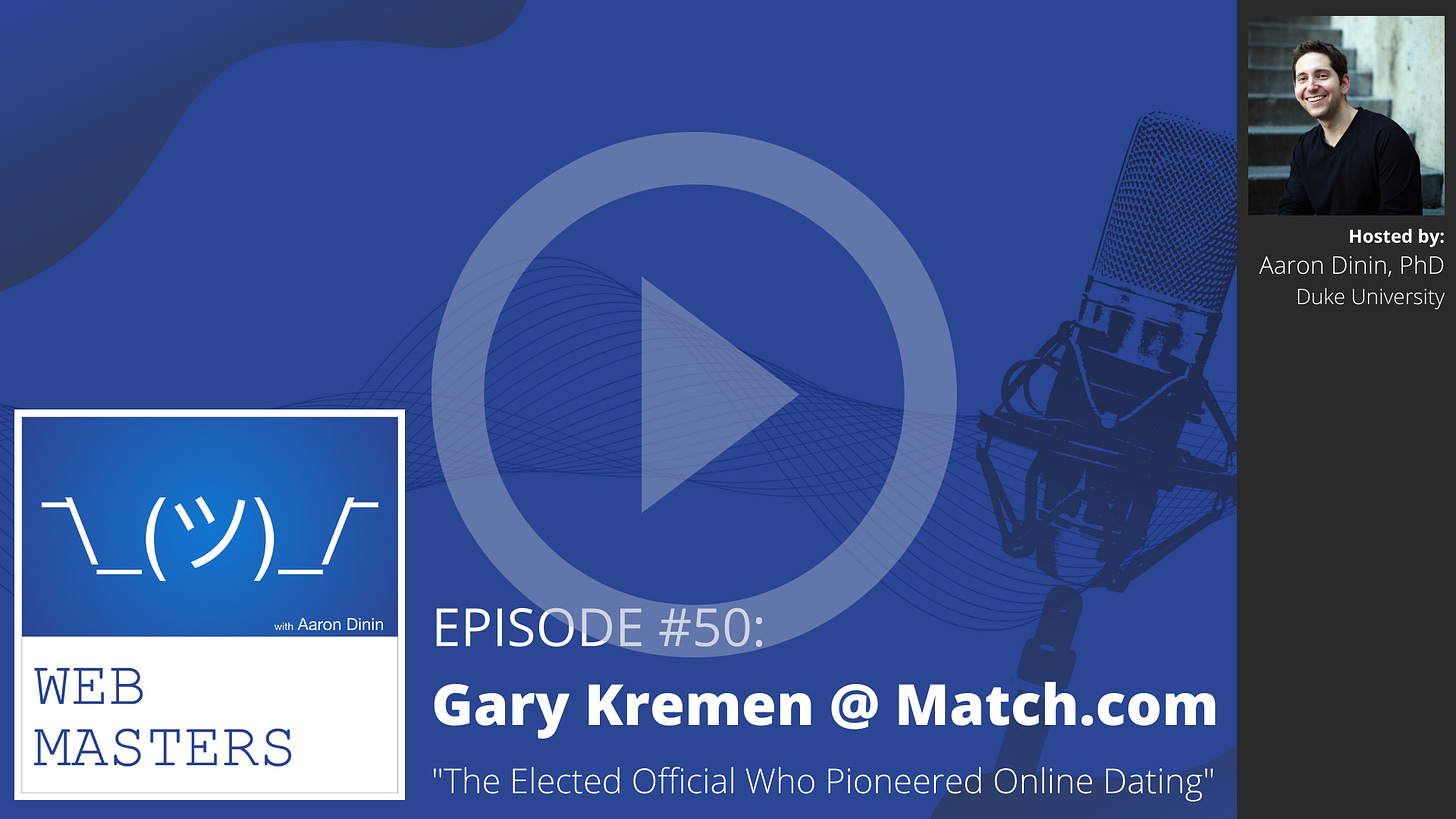
Entrepreneur Office Hours - Issue #52
Web Masters turns one, intellectual property becomes cool, and entrepreneurs are still building their startups backwards
In addition to the usual collection of articles and Q&A, in this issue I’m celebrating one year of Web Masters with our 50th episode! It features Gary Kremen, founder of Match, the pioneering online dating service.
When my team and I started Web Masters, it wasn't even clear I'd be able to get people to talk with me. Fast forward a year, we've had dozens of amazing conversations with some of the worlds most successful Internet entrepreneurs. And the project is only just beginning.
I want to thank all the people who've helped us get where we are, and, especially, I want to thank the thousands upon thousands of people just like you who've been listening and enjoying the show. I’ve got lots more incredible entrepreneur stories lined up for year number two. If you're not already listening, just trust me for once and give it a shot.
For what it's worth, the usual response I get after someone finally listens to an episode is: "Wow! That was way better than I expected." And I'm OK with it... better to pleasantly surprise people than disappoint them, right? 🤣
-Aaron
The Elected Official Who Pioneered Online Dating
You’re probably vaguely aware that Match.com was the first dating website. But the Match.com you know about isn’t particularly similar to the Match.com Gary Kremen founded in 1993. In fact, the site that became Match.com was actually founded before the World Wide Web even existed.
Get the full story on a very special 50th episode of Web Masters:
…or search “Web Masters” wherever you listen to your favorite podcasts.
Why Software Entrepreneurs Should Care About Patents
Personally, I’ve never been a huge fan of patents. But I could be wrong. Sometimes, claiming your intellectual property isn’t just a good way for lawyers to get rich.
FROM THE ARCHIVES…
The Three Words No Early-Stage VC Wants To Hear
The second piece I ever published on Medium is somehow still one of my most popular articles. That’s because its advice about what not to say to investors is just as important today as it was back when I wrote it.
Office Hours Q&A
———————
QUESTION:
Hello,
First of all, I just want to say that I am extremely inspired by your article - 'The Real Reason Why No One is Buying Your Startup's Product'
I am in the process of launching a product in a new market in the Indian Edtech space, and your Museum and Train analogy [from that article] completely changed the game for me, so thank you so much for that.
Currently, I'm having some trouble with building our community right now. I launched an app with free notes and blogs approximately a week ago to act as a hub for the same. I have tried promoting it by posting on different social media platforms and paid facebook ads, but the response has been quite lukewarm.
Do you have any advice regarding how we can go about creating a community, especially as an unknown new startup?
Also, is it a good idea to build the community on the app? Or would it be better to employ methods such as Whatsapp groups or Facebook Ads, basically communities inside existing social media?
Thank you so much for the help!
Regards,
Trishala
------------------
Based on your question, it seems like you’ve done what I often describe as “building your startup backwards.” You built your product before you figured out how to reach the audience you’re going to sell it to. To avoid rehashing the same concepts, you can read more about this common problem here. And here’s an article describing a solution.
With that context out of the way, let’s jump straight to the meat of your question, which is a question about creating a community.
In order to figure out how to build a community, start by answering this question: Who has the problem you’re trying to solve?
The people who have that problem are the same people you need in the community you’re trying to build, which brings us to our next question: What kind of content can you create that will appeal to that community?
To help explain what I mean, let’s consider the example I shared in the linked article above. In the article, I describe a conversation with an entrepreneur who’d build an app to help diabetics manage their blood sugar levels. She launched the app but had no users, which sounds like the challenge you’re facing.
In the article, I explain to the entrepreneur that, rather than launching the app as Step #1, she should have launched a YouTube channel or TikTok or blog or Instagram account focused on providing health advice for diabetics. If she’d been able to successfully grow a social media account with health advice for diabetics, she’d have A) demonstrated demand for her product; and B) created a perfect community into which she could sell her app.
In your case, you should be considering a similar strategy. Unfortunately, it’s hard to be more specific because the market you’ve referenced -- EdTech -- is still a broad space. Are you targeting EdTech providers? EdTech consumers? Someone else entirely?
Whatever the case, the questions are the same: Who has the problem you’re trying to solve and what kind of content will appeal to that community?
Once you answer those questions, building a community becomes a process of consistently creating appealing content and sharing it across the right platform(s).
To be clear, content creation and community building is a HUGE undertaking. Expect to spend years building your community as you figure out what kind of content your target users like, where best to post it, how often to post, and how to grow the audience for it.
As for your question about whether to build the community in your app or on another platform, you’ll most likely have to start by building your community on other platforms and slowly siphon it onto your platform. Trying to build the community directly on your own platform is going to make things 50x harder because of the classic “chicken or the egg problem” -- i.e. without community members nobody will want to engage, and without engagement, nobody will want to join your community. You can avoid all that by going to where users are already active (Facebook, Reddit, TikTok, Instagram, etc.) and engaging audiences there. It’ll still be a slog, but, for what it’s worth, it’ll be a more efficient slog.
Unfortunately, there are no shortcuts to audience/community building. Time, effort, and experimentation are your only options. It’s going to be frustrating. You’re going to feel like your audience isn’t growing fast enough. So long as you still believe in the value of what you’ve built, just keep reminding yourself that audience growth is a long process, and keep churning out new and valuable content.
Got startup questions of your own? Reply to this email with whatever you want to know, and I’ll do my best to answer!







